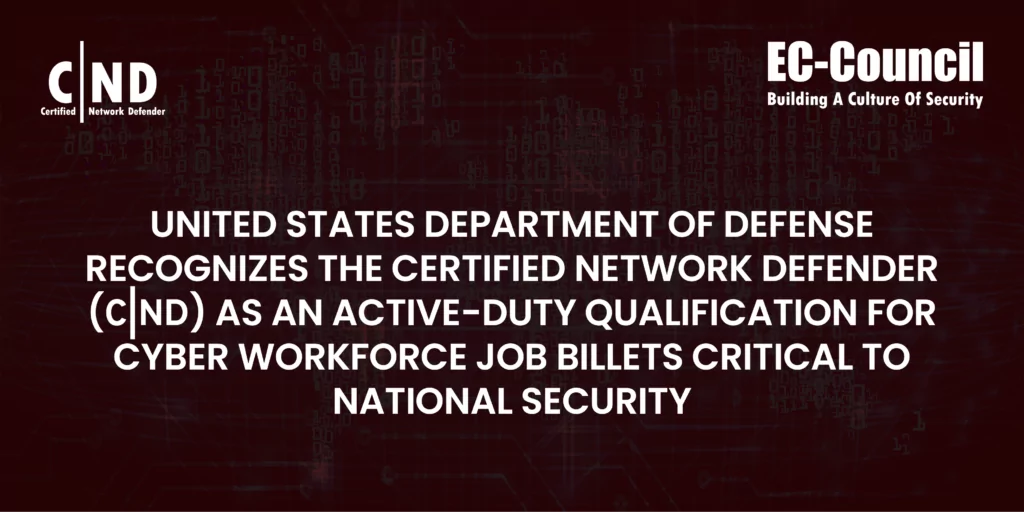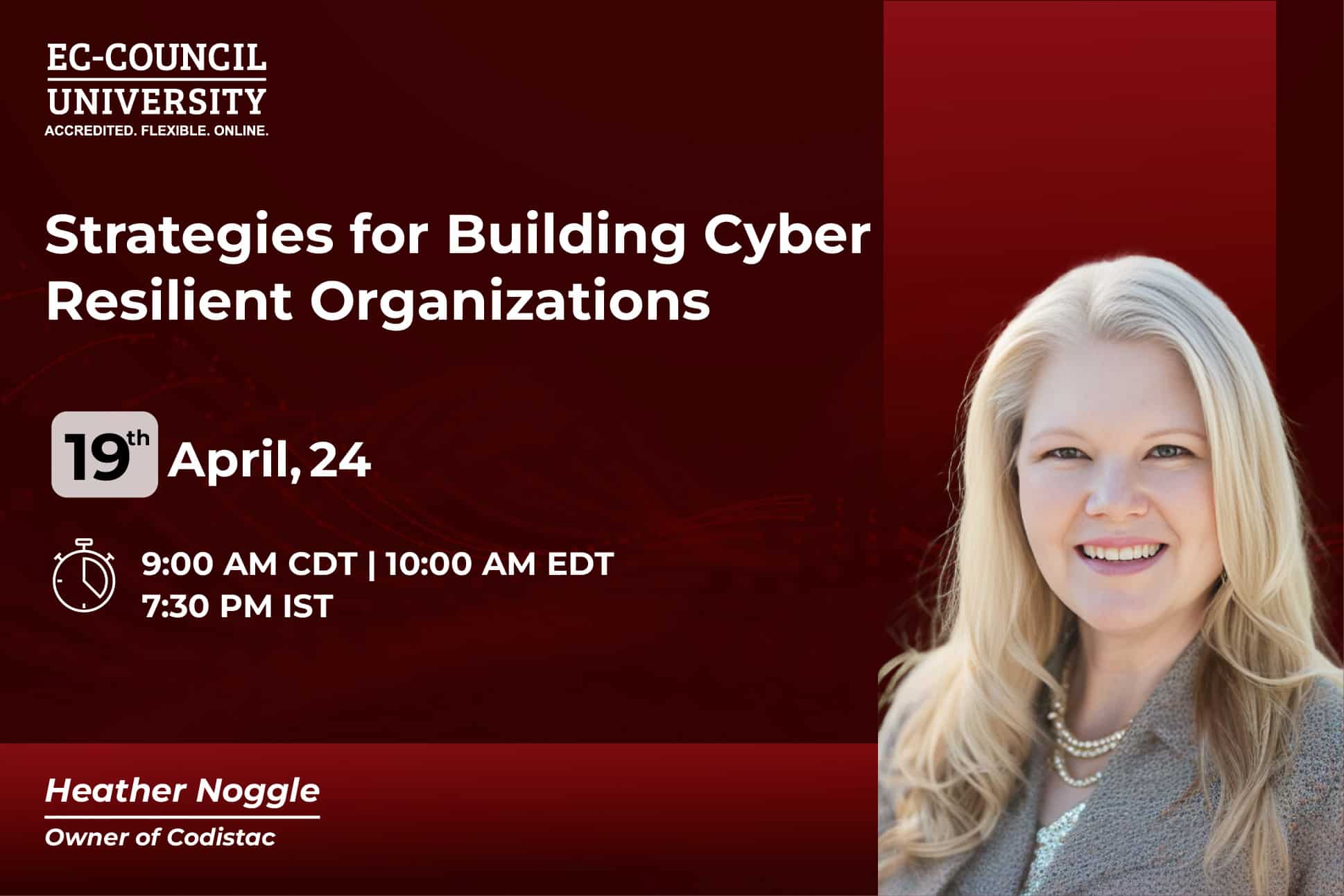31 DCWF Job Roles that Recognize EC-Council Certifications. (DCWF Job roles that Recognize C|EH are highlighted)
| Role | Basic | Intermediate | Advanced |
|---|---|---|---|
| (211) Forensic Analyst | C|HFI | ||
| (212) Cyber Defense Forensics Analyst | C|HFI | ||
| (221) Cyber Crime Investigator | C|HFI | ||
| (411) Technical Support Specialist | C|ND | ||
| (422) Data Analyst | C|CISO | ||
| (441) Network Operations Specialist | C|ND | C|EH | |
| (451) System Administrator | C|ND | ||
| (461) Systems Security Analyst | C|ND | ||
| (511) Cyber Defense Analyst | C|EH | ||
| (521) Cyber Defense Infrastructure Support Specialist | C|ND | C|EH | |
| (541) Vulnerability Assessment Analyst | C|EH | ||
| (611) Authorizing Official/Designating Representative | C|CISO | ||
| (612) Security Control Assessor | C|CISO | ||
| (631) Information Systems Security Developer | C|ND | ||
| (632) Systems Developer | C|ND | ||
| (641) Systems Requirements Planner | C|ND | ||
| (651) Enterprise Architect | C|ND | ||
| (661) R&D Specialist | C|EH | ||
| (671) System Testing & Evaluation Specialist | C|ND | C|EH | |
| (722) Information Systems Security Manager | C|CISO | ||
| (751) Cyber Workforce Developer and Manager | C|CISO | ||
| (752) Cyber Policy and Strategy Planner | C|CISO | ||
| (801) Program Manager | C|CISO | ||
| (802) IT Project Manager | C|CISO | ||
| (803) Product Support Manager | C|CISO | ||
| (804) IT Investment/Portfolio Manager | C|CISO | ||
| (805) IT Program Auditor | C|CISO | ||
| (901) Executive Cyber Leadership | C|CISO |
What are DoD 8140 and DoDM 8140?
DoD 8140, Department of Defense Directive 8140, in combination with DoDM 8140 and DoDI 8140, collectively serve as a comprehensive set of guidelines that navigate the classification and qualification requirements for individuals serving in cyber security capacities within the United States Department of Defense. The three documents jointly accomplish the following:- Establish a mandate across the DoD for the required qualifications of members working in the DoD cyber space workforce
- Identify specific members of the DoD cyberspace workforce based on their assigned work roles
- Implement policies, assign role-based responsibilities, and outline procedures for the qualifications of personnel in the DoD cyberspace workforce
What is the DoD Cyberspace Workforce Framework (DCWF)?
The DoD Cyberspace Workforce Framework (DCWF) presents a structured taxonomy for cyberspace work roles, detailing the associated responsibilities through requirements for tasks, knowledge, and skills. When combined with DoD 8140, the DCWF establishes specific work role requirements and qualification criteria for members of the DoD Cyber Workforce. CND – Certified Network DefenderAbout C|EH Program:
EC-Council’s Certified Network Defender (C|ND) is a vendor-neutral network security certification that equips students with the critical skills required to defend networks and analyze and harden computing systems in the current IT infrastructure. Certified network defenders are trained to apply defense and countermeasure strategies, contributing not only to attack prevention but also to detection, response, and remediation processes and techniques. Students learn through a lab-intensive program and build skills through hands-on learning with over 80 complex labs.C|EH Program Outline
| Network Attacks and Defense Strategies | Administrative Network Security | Technical Network Security | Network Perimeter Security |
| Endpoint Security-Windows Systems | Endpoint Security-Linux Systems | Endpoint Security- Mobile Devices | Endpoint Security-IoT Devices |
| Administrative Application Security | Data Security | Enterprise Virtual Network Security | Enterprise Cloud Network Security |
| Enterprise Wireless Network Security | Network Traffic Monitoring and Analysis | Network Logs Monitoring and Analysis | Incident Response and Forensic Investigations |
| Business Continuity and Disaster Recovery | Risk Anticipation with Risk Management | Threat Assessment with Attack Surface Analysis | Threat Prediction with Cyber Threat Intelligence |
Key Benefits and Features of C|ND
- The world’s first network security program with adaptive security strategy: 1. Protect 2. Detect 3. Respond 4. Predict
- 80 hands-on labs: more labs than any globally recognized network security certification
- The C|ND is a mix of theory and practical sessions, which gives students hands-on training experience.
- Accredited by the ANSI National Accreditation Board under ANSI ISO/IEC 17024
- Pathway to a Career on a Blue Team
- Mobile and Internet of Things (IoT) Security
- Tactical Defense of Cloud Services
- Learning Beyond Technical Aspects
- Building Perimeter Defense Skills
- Immersive Practical Training
- Recognized by the National Cyber Security Centre NCSC – part of GCHQ (UK’s intelligence, security, and cyber agency) Approves EC-Council Training as meeting CYBOK requirements.
C|ND Training and Examination Information to Get Certified
Please visit the C|ND Training Page, complete the form, and speak to a career advisor who will guide you through the certification process and address any other queries regarding the course. Training Options Training Options: iLearn (Self-Study) / iWeek (Live Online) / Master Class / Training Partner (in person) Examination Format Number of Questions: 100 Test Format: Multiple Choice Test Duration: 4 Hours For more information visit C|ND Certification & Training ProgramFAQs
DoDD8140 Job Roles Mapped with Certified Network Defender (C|ND)
References
Glassdoor. (2023, June 14). How much does a Cyber Defense Infrastructure Support Specialist make? https://www.glassdoor.com/Salaries/cyber-defense-infrastructure-support-specialist-salary-SRCH_KO0,47.htm
Glassdoor. (2023, August 6). How much does a Technical Support Specialist make? https://www.glassdoor.com/Salaries/technical-support-specialist-salary-SRCH_KO0,28.htm
Glassdoor. (2023, June 14). How much does a Test & Evaluation Specialist make? https://www.glassdoor.com/Salaries/test-evaluation-specialist-salary-SRCH_KO0,26.htm
Salary.com. (2023, July 25). Enterprise Architect Salary. https://www.salary.com/research/salary/posting/enterprise-architect-salary
Salary.com. (2023, July 25). Information Systems Security Analyst Salary in the United States. https://www.salary.com/research/salary/posting/information-systems-security-analyst-salary
Salary.com. (2023, July 25). Network Operations Specialist Salary. https://www.salary.com/research/salary/recruiting/network-operations-specialist-salary
Salary.com. (2023, July 25). Systems Administrator I Salary in the United States. https://www.salary.com/research/salary/benchmark/systems-administrator-i-salary
Salary.com. (2023, July 25). System Developer Salary. https://www.salary.com/research/salary/recruiting/system-developer-salary










